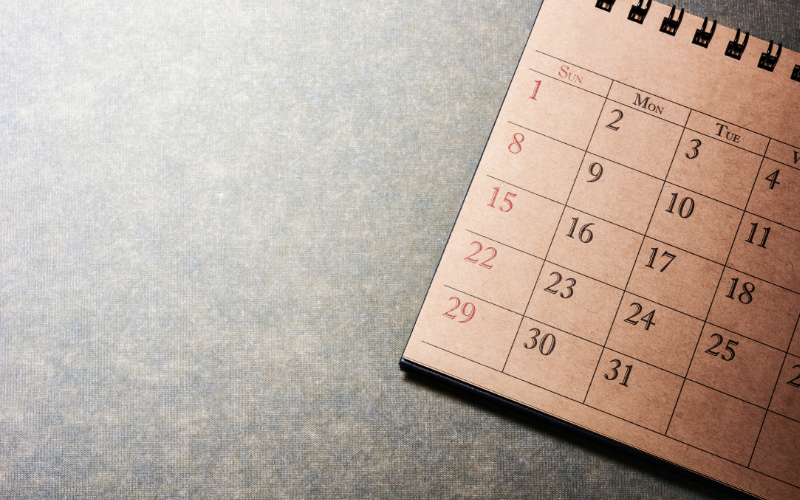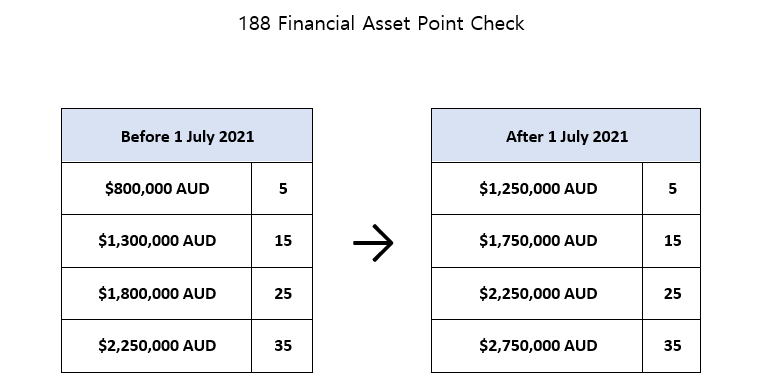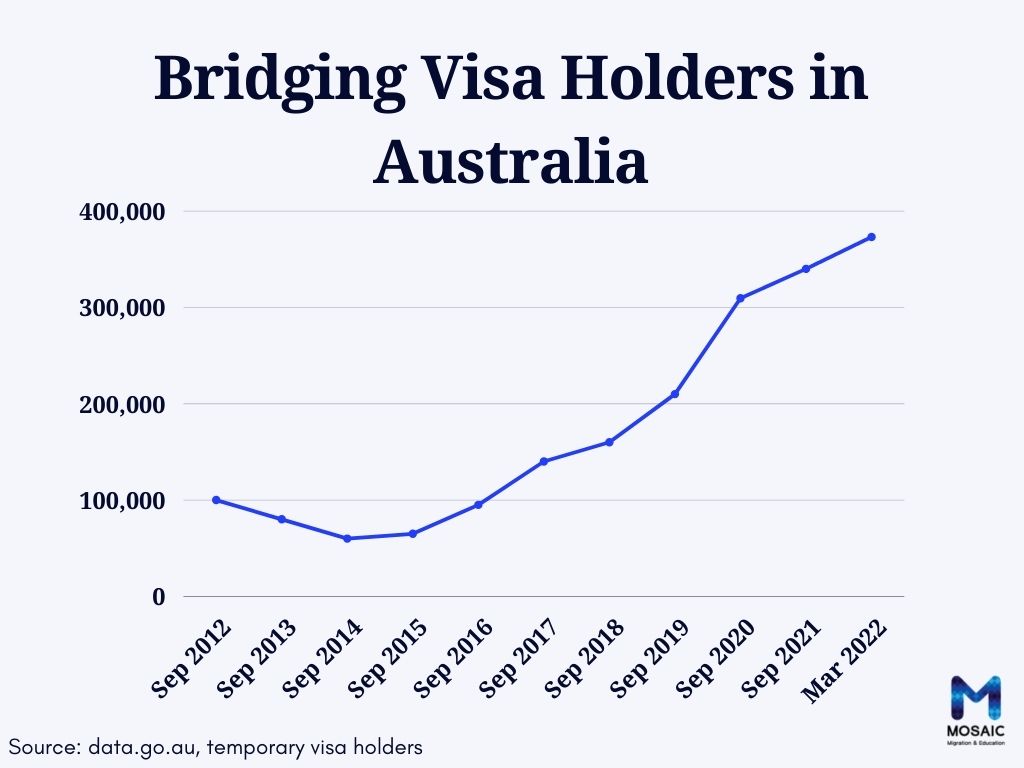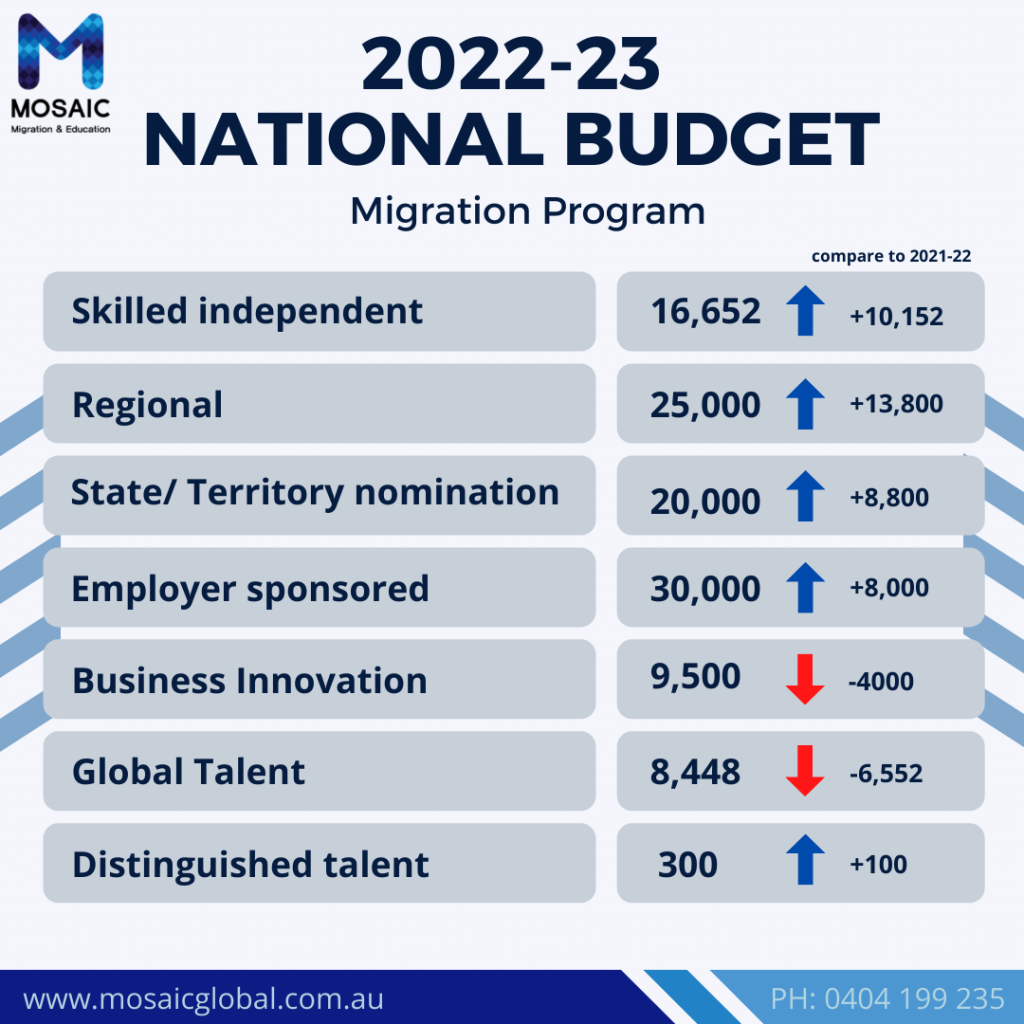
Why Timing Matters when Applying for State Sponsorship
In this column, we will look at the number of migrants allocated to the State by the Australian Federal Government every fiscal year and the importance of timing when applying for a State Sponsorship.
According to our previous column, ‘2023 Federal Prospects Budget’ uploaded on April 20, 2022, we can see that the number of the Business Investment visa was decreased by 4,000 more from the previous year, 13,500 places, with 9,500 places now.
My L, planning to immigrate to Australia on a 188 Business Visa from Korea, read our columns and had his first consultation with us through Kakao Talk on March 28.
During the consultation, due to time constraints such as preparing documents, we expected to apply after July 1, 2022, when the next fiscal year starts. However, After the announcement of the 2023 Federal Budget on March 30, of 4,000 places decreasing in the 188 Business Visa, our Mosaic Team strongly recommended Mr L to apply before the end of this fiscal year 2022 despite the short time frame. Based on Mosaic Migration’s long experience and belief in putting customers as our top priority, Mr L accepted our proposal. On April 14, we signed a 188-business visa client service agreement and officially started filling out questionnaires and preparing documents.
Mr L, who actively prepared for the EOI application in a short time, submitted his EOI (Expression of Interest) on May 4, and the Queensland State Government accepted the Initial Invitation on May 10. The Nomination was approved two weeks after the Invitation to lodge on May 23 without any further questions or additional document requests. The case has been processed very quickly and receiving a nomination after 5 weeks of signing the Client agreement is rare.
During the whole period of receiving the Nomination and signing the Client Agreement Contract on May 23, 2022, we could never have face-to-face consultation because Mr L was in Korea. But thanks to trusting in our company and actively following our suggestions, we were able to get good results in a short amount of time.
The deadline for State Sponsorships for each visa may vary as each State receives a State Quota from the Federal Government and must exhaust all places within the Fiscal Year. For example, on May 6, 2022, the State of QLD announced that they would no longer accept EOI (Expression of Interest) for Provisional Skilled Immigration Programs (subclass 190 and subclass 491). However, since the Business and Investment visas did not meet their allotted amount this year, Mr L could get State Sponsorship on May 10.
For reference, Victoria has no longer received applications after 5 pm April 29. And In the case of South Australia, they announced on June 7 that they would no longer accept applications for state Sponsorship of the fiscal Year 2022 on these dates for the following visas.
- Business Visa until June 9, 2022, 4:00 pm
- Investment Visa and Large investment visas until June 2, 2022, 4:00 pm
- Offshore Sponsorship for Independent Skills Immigration until June 9, 2022, 4:00 pm
- Onshore applications until June 23, 2022, 4:00 pm
As such, each State may not receive an invitation for EOI (Expression of Interest) and State Sponsorship for that Fiscal Year at any time, even before the end of the fiscal year, if the allotted places are met. Therefore, when preparing for visas that need State Sponsorship like the subclass 188 Business and Innovation Visa, the timing of submitting the EOI (Expression of Interest is also very important.
The new Fiscal Year begins on July 1, 2023 but given the past three years that States have started accepting letters EOIs in October and November, we are not sure when the State will begin receiving EOI in the new Fiscal Year 2023. A few states are still accepting EOI in fiscal 2022 for Business investment visas, so we hope those who wish to file in the fiscal year 2022, with about a month left, do as soon as possible.
In the next column, we will discuss the 407 visa.

Case Study – 188 Investor Visa Application by changing State
This column will look at a visa application case made possible by changing the State for State Government Sponsorship.
Our Client, Mr R, applied for the State Sponsorship before the new 188 Business and Investment visa conditions were announced on July 1, 2021. However, because of the new requirements from July 1, 2021, he had to change the State for State Government Sponsorship to apply for the 188 Investor Visa.
Mr R, wanted to apply for an investment visa through the New South Wales sponsorship and signed the first contract in December 2020. After preparing for about 2 to 3 months, he applied for the State sponsorship. However, they did not receive State sponsorship until June 30, the end of the fiscal year 2021, and had to submit a new letter of intent under the terms and conditions changed after July 1, 2021.
The Australian 188 Business Investment visa eligibility requirements generally described in our column are conditions that 188 visa applications must meet under the requirements of the Australian Federal Government. However, a State Sponsorship must be obtained to apply for the visa. Each State often has additional requirements to select the most suitable applicants. For example, immigrants who wish to do business or live in urban areas such as Sydney, Brisbane, or Melbourne, require a higher application score and higher investment requirements and assets than immigrants who settle and plan to do business or investment in rural areas.
Even under the conditions raised after July 1, 2021, Mr R could obtain enough points to submit a letter of intent. However, because NSW changed its age qualifications to under 50, Mr R, who was 54, could not receive a state sponsorship because of age restrictions.
While preparing for the visa together, we suggested changing the State government to Queensland, considering his plans, business tendencies and lifestyle. Mr R positively accepted our suggestion, received the letter of intent within 1 week, and successfully applied for the 188 Investor visa.
After receiving the Queensland Government Sponsorship successfully, he was able to lodge his 188-visa application. Mr R, who was 54 at the time of application, may not have been able to apply for the 188 Investor Visa if he had not fully understood the different requirements of each State’s visa and had not trusted us and accepted the offer positively. Moreover, because of the age limit, he may not have expected to apply for the 188-investment visa.
Compared to the past, each State government has more stringent and specific requirements when selecting suitable immigrants for the development direction of the State Government. It is essential to take the advice of a migration agent who clearly understands the basic business investment visa requirements and the State requirements to which you wish to immigrate before making your immigration plan.
In the next column, we will examine the correlation between the number of immigrants allocated by the federal government to the State and the timing of application through the case of Mr L, who obtained state sponsorship in May 2022.

188 Business and Investment Visa adjustment in 2012 and 2021
This article will compare the change after the Australian 188 Business and investment visa on 1 July 2021 with the year after the change in 2012.
Due to changes in the conditions and subclass adjustment of 188 Business and investment visas in 2012, the number of visa applicants in Korea and Australia decreased significantly in 2013 and 2014.
Many people who prepared for the 188 Investment visa or was waiting for a sponsorship after submitting the letter of intent by 2011 could not meet the qualifications because the investment amount had doubled from $750,000 to $1.5 million in 2012. Due to this, many people considered immigrating to other English countries such as the United States and Canada. However, the number of applicants for business and investment visas in Australia steadily returned in fiscal 2016.
Because of this, many expected a rise again in the Australian investment visa score in 2020. Likewise, according to the change of requirements announced in 2021, the investment amount requirement doubled from $1.5 million to $2.5 million. However, despite the increase in the minimum assets requirements from $800,000 to $1.25 million, inquiries for Australian business and investment visas have increased.
Many applicants planning to immigrate to Australia has risen significantly compared to 2012, with the 188 Business and Investment visa. As a consequence of wanting to live in a better environment, obtaining permanent residency for their children after studying in Australia, and the opportunity in business and investment in Australia. Also, the rapidly changing political and economic situation in Korea and visa requirements seems to significantly impact the number of Australian immigrant applications. Thus, despite the changed conditions in 2021, the number of applicants has risen considerably compared to 2012 and is no longer impacted considering immigration to Australia. Due to global inflation in decades, the number of people preparing to immigrate to Australia is likely to increase in the next few years unless the Australian immigration law changes again.
In the next column, we will look at the two most recent cases of 188 business visas. Firstly, a real case where the change of State was necessary to gain state sponsorship because of the changed 188 investment visa qualifications, and another case of applying for the 188-investment visa in Korea.

Federal Election 2022: Australia’s government changes in 9 years
This column will look at the changes Australia will see under the Labour Government in power after 9 years.
Australia’s 2022 federal elections, held on 21 May, ended with Labour’s victory over the Liberal Party led by Prime Minister Scott Morrison for the first time in 9 years.
This election was of particular interest to many people because it was held shortly after the 2022-23 Federal Budget was announced.
Many changes are expected with the 31st Prime Minister, Anthony Albanese of the Labour Party.
The Australian Labour Party has yet to announce a policy on immigration policy, but they have mentioned that the overall immigration system needs to get revised. As mentioned in the previous column, the Gridlock situation is the biggest problem with the current Australian visa system and the expectation of people on how the Labour party will deal with this situation is significant.
According to the main objectives of the Labour Party’s immigration policy attached to the ALP National Platform in November 2021, it was announced as follows:
• Meeting skills shortages
• Protecting local employment opportunities and working conditions
• Preventing exploitation of temporary workers, particularly international students and working holidaymakers
Prime Minister-elect Anthony Albanese said he would prefer permanent migration over temporary migration, given Australia’s image as a successful multicultural country in the world. He said he would consider giving permanent residency to foreign workers so that immigrants don’t remain “permanently temporary”. He also emphasized that he would increase the number of nurses in aged care homes, saying that immigration policies could bring in a foreign nurse to Australia.
It is hopeful news for those currently preparing for immigration and permanent residency in Australia. However, with the changes in immigration policy coming ahead, people preparing for immigration and permanent residence will need to prepare well.

188 Business and Investment Visa Update
This column will look at the 188 Business and Investment visa eligibility requirements that have changed from 1 July 2021, revised in 9 years since 1 July 2012.
Firstly, there is no change in visa subclass numbers compared to the adjustment in 2012. However, in the modified amendment, the Premium Investor Stream, commonly known as 188D, which required an investment of 15 million, has been removed.
The minimum Financial Asset and Business Turnover requirements of the 188 visas in the point-based Immigration program have been raised to account for inflation over the past 9 years as follows.
- Minimum Financial Asset has risen from $800,000 to $1.25 million.
- Assets are the assets before the submission of the EOI (Expression of interest), (To apply for asset points, you must have the assets listed in the table below for at least two fiscal years)
- Includes both Business and Personal assets
- Include all assets of the primary and secondary applicant

- Business Turnover requirement has changed from the previous minimum of $500,000 to $750,000 per year.
- Two highest fiscal years among the four fiscal years before the submission of the EOI (Expression of interest)
- Can apply for the sum of two businesses’ revenue
✦ Additional requirements for Ownership Interest in Main Business ✦

- If you received a Provisional sponsorship on or after 1 July 2021, the duration of the 188 visa has changed from 4 years 3 months to 5 years.
- In the case of 188 business visa extensions, the following changes have been made according to the time of receiving the sponsorship of the visa.
1) Invitation before 1 July 2021 → Total of 6 years
2) Invited on or after 1 July 2021 → Total of 7 years
3) If the visa you have at the time of application is 188 Innovation Extension stream → Total of 8 years
- For extension of 188 Significant Invest Visa:
- If the sponsorship of the visa you have before has received an invitation before 1 July 2021 → Total of 6 years
- If the sponsorship of the visa you have before is invited on or after 1 July 2021 → Total of 7 years
- Extend after extension to 1) →Total of 8 years
- Extend after extension to 2) → Total of 9 years
Fortunately, the age range, English proficiency, business and investment experience and educational background remain unchanged.
It has been about a year since the 188 Business Investment visa application conditions changed. In the next column, we will show you how the changed conditions applied to real cases compared to after the changes in 2012.

How will the Federal Election affect the Visa system?
While the 2022 Federal election is coming ahead, people wonder how the election will impact the immigration policy.
Immigration is an ever-present issue in the political debate, especially nowadays, because there has been no mention of the current visa system during the election campaigns.
The current visa system is described to be out of control because of the ‘gridlock’ situation. Gridlock is when the visa applicants wait for their decision and are placed on a bridging visa to maintain their lawful status. However, as the gridlock keeps extending, the number of bridging visa holders increased to over 200,000 in 2019 and 373,109 as of March 2022.

It captures people’s interest even more because the 2022 Budget shows a dramatic reduction in the Department of Home Affairs’ resources. These include the Migration management falling from $397 million in 2021-22 to $360 million in 2022-23 and $291 million in 2023,24. Not only but the funding for the immigration functions of the Department of home affairs from $2.6 billion in 2021-22 to $1.7 billion in 2023-24, showing a decline of $0.9 billion over two years.
Despite the dramatic reduction digits on the funding for the immigration functions, the number of people in Australia waiting for their visa application results is increasing more and more.
With the travel restrictions easing, more people are expected to be coming to Australia. However, with the exiting massive gridlock in the visa system and deducted funding, the Department of Home affairs will likely reduce its ability to deliver its immigration functions.
Many people are looking forward to how the outcome of the upcoming Federal Election affects the immigration policy.
The 2022 Australian Federal Election will be held on 21 May 2022.

TSS Subclass 482 Visa Update
The Australian Government has updated additional information about the valid period of the new pathways for subclass 482 short-term holders who are eligible to apply for permanent residency on April 21, 2022.
On March 18, 2022, the Australian Government announced that from July 1, 2022, subclass 482 short-term holders may be eligible to apply for the Permanent Visa.
To be eligible to apply as a short-term stream TSS 482 visa holder, applicants must have been in Australia during the COVID period (February 1, 2022, and December 14, 2021) for at least one year.
This article will outline the changes to the 482 Short Term occupations and the valid period of the new pathways.
The changes to the 482 Short Term occupations are:
- (Legacy 457 Worker) Age Limit exemption
If you have held a 457-visa on or after April 18, 2017, the age limit is waived when applying for a 186 TRT visa.
The age exemption will be accessible for 2 years from July 1, 2022
- Apply Third TSS Visa in the Short-Term Stream in Australia
If a 482 short term visa holder needs to extend a 482 short term visa, a third 482 visa can also be applied in Australia if the new application is made before July 1, 2023.
The third TSS visa will be accessible for 1 year from July 1, 2022
- Permanent Residence through 186 TRT Stream
Existing TSS subclass 472 visa holders in the short-term stream will be able to apply for a Permanent Residence through the 186 TRT stream.
This pathway will be available for 2 years from July 1, 2022
Contact us if you want to find out more about the eligibility requirements or want more information.

Immigration trends in the 2023 Federal Budget
Greetings.
We are pleased to announce that our news catalogue will be resuming with the latest Australian Immigration news, updates, and information. Due to the relocation and realignment of our organisational changes, we were not able to provide any immigration news for the past few months. However, as part of this update, we will provide the latest immigration news on our website and our social media channels.
In this article, we will look at the major change seen in the Migration Program, and the Immigration Trends of the 2022-23 Federal Budget recently announced in early April.

As shown, the biggest change seen in the Migration Program is the major decrease in the places for Business Investor visa, Global Talent visa, and Partner visas and a significant increase in the places of Skilled Immigration and Employer visas.
The Business Investor visa and Global Talent visa are experiencing significant reductions in the new places announced, and it is surprising news for the prospective applicants for these visas. In particular, the numbers look more dramatic compared to 2021 and the year before, when the places increased three times for the Global talent visa and doubled in 2021 compared to 2020 for Business Innovation visa. Also, compared to past places during the covid pandemic, there is a big decrease for Partner Visa as well.
It can be assumed that,
▶ There was a need to secure more places in the Skilled Migration visas for the 482 short-term list occupation. As briefly mentioned in the previous post, 482 short-term list occupations were impossible to apply for a Permanent Residence but as of the new regulations, they are now eligible to apply through the 186TRT stream.
▶ The significant increase in Regional visas can be seen as a positive reflection of the strategies for regional growth and development that the Australian Government has pursued for several years.
▶ The significant increase in the State/Territory Government-sponsored visas also allowed the Federal Government to grant powers to each State/Territory Government, allowing them to select the required occupations, skill levels, and age that can contribute to the growth of the government.
The Migration Program plays a significant part in the Australian Federal Budget announcement. It plays a big role because it balances the development in each State/Territory Government.
A key aspect of the Federal Budget for 2023 is it has expanded the opportunity to apply for a permanent residency to non-permanent residents who have contributed to the Australian economy and stayed in Australia during the Covid-19 period. The Government has increased the places of the Skilled Independent visa, Regional visa, and State/Territory Government-sponsored visas to revive local and regional economies that have been affected during the COVID-19 pandemic.
Therefore, to maintain the ceiling of 160,000 places, the Government had to reduce the numbers of Business Investment visas, Global talent visas, and partner visas, which have benefited from increased places over the past two years. In the case of partner visas, which increased numbers during the Covid-19 period to help reunite family members, the reduction in numbers does not seem to have a significant effect as much as foreigners are able to enter Australia.
Based on the past processing times and requirements for when the Business Investment visa places were more significant, it is now reasonable to expect a higher EOI score requirement to receive a sponsorship from the State/Territory Government and a more extended processing period.
Especially, with the revised criteria in 12 years since 1 July 2021, the qualification requirements to grant a State/Territory sponsorship is expected to greatly affect prospective visa applicants with the processing period and EOI score needs.
Over the past 13 years of processing many clients’ permanent residency visas, there were hardly any times I recount a positive change in immigration laws for those who want to immigrate to Australia. As I emphasise in every consultation, if you are eligible to apply, we recommend that you do so as soon as possible without any delay. If you are thinking of immigrating for a business investment visa, I recommend applying as soon as possible before the financial year 2022 is over.
The criteria for calculating the Business Investment visa score and qualification requirements that will be applied from July 2021 will be explained in detail in the following article.

What is the Business Innovation and Investment visa (subclass 188)?
The Business Innovation and Investment visa (subclass 188) is a points-based immigration programme that requires nomination from a state or territory government.
This visa is for people with successful business or investment experience who want to own and manage a new or existing business in Australia, or to invest in an Australian state or territory. The visa is a pathway to the Business Innovation and Investment permanent residency visa (subclass 888).
On 1 July 2012, the basic requirements of the business/investment visa (subclass 160 -165) have been changed by double which have been in effect for more than eight years. The number of inquiries decreased for a while due to the sudden change of the requirements in 2012, but the visa has grown in popularity again from 2014 as the age limit is under 55 or even no limit, and the various benefits are provided on provisional visa.
There are six types of subclass 188 visa currently in effect. It is also called 188 A, B, C, D & E depending on how institutions or people call it.
188 A – Business Innovation Stream
188 B – Investor Stream
188 C – Significant Investor Stream
188 D – Premium Investor Stream
188 E – Entrepreneur Stream
188 – Business Innovation Extension & Investor Extension Stream
The most common ones out of the above six types are 188 A – Business Innovation Stream and 188 B – Investor Stream. We will talk about the reason one by one in the upcoming columns.
To apply for the subclass 188 A and 188 B visa, applicants must have at least 65 points (each state may require additional requirements or higher scores) based on the age, academic background, business/investment experience, sales and assets specified by the Australian Immigration Department.
Subclass 188 visa is not a permanent visa, but it is called a provisional visa.
The reason is that if approved, a valid visa for four years and three months is provided (up to eight years if applying for an extension), and also the freedom to study, work, and do business/investment in Australia, and free school fees for children – the benefit of permanent visa holder.
In 2019, for the improvement of the visa programme which has been in effect for the past eight years, the Department of Home Affairs has asked some immigration agents or lawyers for the new proposals and measures. We are not sure when the new programme will be introduced, but due to the Coronavirus Pandemic, the visa would be continued to take effect for the time being without any major changes.
However, in my point of view, if the basic requirements are changed, it will be more difficult to apply for the visa with the condition for the current requirements, as what happened in 2012. People who are planning or preparing to emigrate through the Business Innovation and Investment Visa are advised to apply as soon as possible before the immigration law is changed again.
In the next column, we will take a closer look at the Eligibility Criteria for the Subclass 188 A – Business Innovation Stream.

Case-study – 188A Business Innovation Stream Visa
In this column, we will talk about 188A visa requirements with real-life cases on the visa.
The most frequently asked questions about the 188A visa are the proof of assets, business experience and dependent children.
Proof of Assets
First, let’s take a look at two real-life cases based on the content from the most received inquiries about the proof of assets.
- A corporate business owner A transferred 20% of the company’s share to researcher B as a scouting offer for a crucial technical advice during the business expansion. In this case, from the time the share is transferred, 20% of the company’s net assets are also considered to be transferred. In other words, calculation of the applicant (A)’s business assets would be (net assets of the entire business x shareholding ratio of the applicant and spouse).
- For C, who inherited a large building with three siblings as an estate, only the equal percentage (25%) of ownership is recognised based on the certified copy of the register, unless there is a specific definition of the distribution, C can’t claim the whole building for the proof of assets even though there is an oral agreement of permission of use. Furthermore, the applicant must meet the condition of transparency of the inheritance process.
Among the questions about assets, there are a lot of questions about whether a virtual currency such as bitcoin is included in the asset. Currently, under Australian immigration laws, all cryptocurrencies (Bitcoin, etc..) are not considered as assets.
Business Experience
The second topic to look at is the business experience and management involvement. The two real-life cases below may seem similar but have completely different results. The success of business is important, but how well the applicant has performed, and managed business is crucial to the visa approval.
- Mr. A ran a restaurant business with two friends, and they owned 33% of the shares each. A has been in charge of the overall responsibility for the business operation on behalf of the two friends who had other work and businesses commitment. Mr. A was able to get the 188A visa successfully by submitting the proof of business experience and management involvement.
- Mr. B, who owned the larger size of the business, received a visa rejection even though the conditions for assets and business turnover meet the requirements. The reason is that Mr. B was in the form of partnership with siblings, and there was no proof of Mr. B has contributed to the overall business operation and day-to-day management.
Under the Australian immigration law, if an annual turnover is over AUD 400,000, there is a condition that the applicant must own at least 30% share in the business, and if an annual turnover is less than AUD 400,000, the applicant must own at least 51% share in the business to prove the applicant’s business management experience.
But, as seen in the above two cases, the critical requirement of business experience and management is the proof that the applicant have been involved in business operations continuously and directly and making important decisions for the business.
There are many inquiries from professionals such as doctors, accountants and lawyers. In the case of professionals, it may be difficult to meet the above conditions depending on the size of business and/or method of operation, management of business. The below two cases are related with doctors.
- Doctor C, a famous plastic surgeon in Korea, achieved great success in a private hospital with his outstanding medical practice. However, according to the Australian Immigration Law, it was considered that director C succeeded in his business based on his own professional medical practice than the ability to operate and manage the business, so it is difficult to prove that Doctor C has a management skills from his previous business. Finally, his visa was refused.
- Doctor D, who operated an ophthalmic clinic, hired 4 other doctors in the same hospital. He committed most of his working hours in operating and managing the hospital instead of seeing patients. In the case of Doctor D, the Australian Department of Immigration recognized his successful hospital operation and management, therefore his visa was granted.
Dependent Children
In fact, there are many people applying for the 188A visa to open up a better future for their children. However, most of the applicants misunderstand the timeline for the age limit of dependent child.
Under the Australian immigration law, the age limit of the applicant is under 55 at the time of submission of an EOI, whereas the dependent child is under 18 (under 23 for full-time students) at the time of visa approval.
- Mr. A, who was preparing for the 188A visa, had three children with his spouse. At the time of submission of an EOI, his three children were 13, 17 and 18, but at the time of visa approval, they turned 15, 19, and 20. Under the Australian immigration law, a dependent child who reached the age of 15 meet the conditions of the dependent child, but the other two children, who turned over 18, needed to show the dependency through full-time student requirements or whether they were financially independent. Eventually, the other two children were considered to meet the full-time student requirements, so they were able to obtain the visas.
The visa processing time may be infinitely long, as the Department of Australian immigration may continue to request additional information or documents depending on how well you have prepared and submitted the visa application.
Looking at the past cases for writing this column, I noticed there were many cases that could have been in trouble if the visa were approved even one day late.
If you apply for the Business Innovation and Investment Visa, you should prepare all the documents required thoroughly with a professional registered migration agent who is particularly has many experience in this Business Innovation and Investment Visa.
In the next column, we will take a closer look at the requirements for the 188B Investor Stream Visa.
